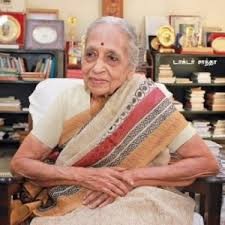Dr.V. Shanta (11 March 1927-19 January 2021 )* is an Indian oncologist and the chairperson of Adyar Cancer Institute, Chennai. She is best known for her efforts towards making quality and affordable cancer treatment accessible to all patients in the country. She has dedicated herself to the mission of organizing care for cancer patients, study of the disease, research on its prevention and cure, spreading awareness about the disease and developing specialists and scientists in various subspecialties of oncology. Her work has her won several awards, including the Magsaysay Award, Padma Shri, Padma Bhushan, and Padma Vibhushan, the second highest civilian award given by the Government of India.
 She has been associated with Adyar Cancer Institute since 1955, and has held several positions, including that of the director of the institute between 1980 and 1997. She has served as a member of several national and international committees on health and medicine, including the World Health Organization's Advisory Committee on Health.
She has been associated with Adyar Cancer Institute since 1955, and has held several positions, including that of the director of the institute between 1980 and 1997. She has served as a member of several national and international committees on health and medicine, including the World Health Organization's Advisory Committee on Health.
Shanta was born on 11 March 1927, at Mylapore, Chennai, into a distinguished family that included two Nobel Laureates, C.V. Raman (grand uncle) and S. Chandrasekar (uncle).
She did her schooling from National Girls High School (now Lady Sivaswami Ayyar Girls Higher Secondary School) and had always wanted to become a doctor. She completed her graduation (M.B.B.S) from the Madras Medical College in 1949, D.G.O. in 1952, and M.D. (in Obstetrics & Gynecology) in 1955.
When Dr. Muthulakshmi Reddy set up the Cancer Institute in 1954, Shanta was about to complete her Doctor of Medicine (M.D.). She had got through the Public Service Commission examination and had been posted to the Women and Children Hospital. In the 1940s and 1950s, Indian women who entered the medical profession generally took obstetrics and gynecology, but Shanta wanted to be different. She decided to join the Cancer Institute instead, upsetting many people in her family.
The institute began as a small, 12-bed cottage hospital with just a single building, minimal equipment and just two doctors, Shanta and Krishnamurthi. For three years she worked as honorary staff after which, the Institute offered to pay her Rs.200 per month and residence within the campus. She moved into the campus on 13 April 1955, and has remained there ever since.
Dr. Shanta is a member of the Tamil Nadu State Planning Commission for Health. She is a strong advocate of early detection of cancer and the need to change public perception of the disease, especially the extreme fear and hopelessness associated with the disease. She has been particularly critical of the metaphorical usage of the name of the disease to describe a dangerous and uncontrollable situation or one of hopelessness.
She was conferred the Ramon Magsaysay Award in 2005. She dedicated the award to her institute. The award citation is worth quoting to describe aptly Dr. Shanta's service. It reads in part:
"In an era when specialised medical care in India has become highly commercialised, Dr. Shanta strives to ensure that the Institute remains true to its ethos, `Service to all.' Its services are free or subsidised for some 60 per cent of its 100,000 annual patients* 87 yr-old Shanta still sees patients, still performs surgery, and is still on call twenty-four hours a day."
Shanta, an elected fellow of the National Academy of Medical Sciences,is a recipient of the Padma Shri Award in 1986, Padma Bhushan, in 2006 and Padma Vibhushan in 2016.
V. Shanta, doyen of cancer care in the country, senior oncologist and chairperson of the Adyar Cancer Institute was 93, when she died on 19th of January 2021.
Dr. Shanta was rushed to hospital after she complained of chest pain last night at about 9 p.m. Sources at the Cancer Institute said there she had a massive block that could not be removed, and the end came at about 3.55 a.m.
Her body has been moved to the old Cancer Institute premises, which she helped build along with her mentor Dr. Krishnamoorthy.
The Cancer Institute is an institution that offers high quality cancer care to all segments of society, irrespective of their capacity to pay, making state of the art treatment available to all. It has a unique graded payment model, based on the capacity to pay — those who could not afford it, were provided free treatment.
Dr. Shanta was active until her hospitalisation, colleagues said, even though she had been feeling under the weather for a couple of days. Even during the pandemic, she was concerned about the new challenges to healthcare that was brought on by the lockdown.
- Thiagu
(This article was published in Fortnightly Magazine 'Abel', January 20, 2021)

